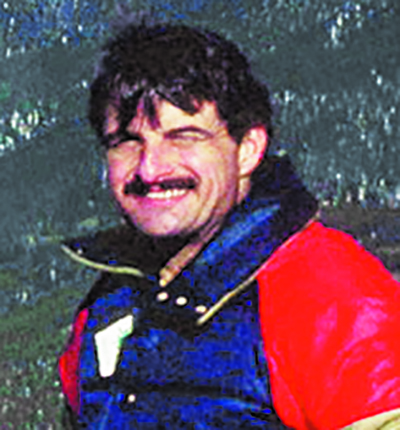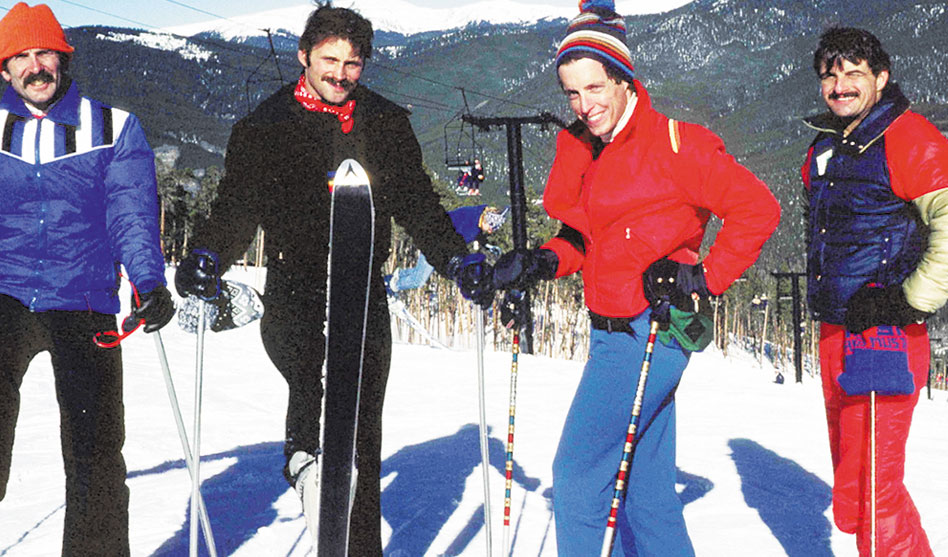Dickie Weaver, right, with friends Bill Nelson, Terry Tebedo and Mike Anglin skiing in Breckinridge in 1980. (Photo courtesy of Mike Anglin)
Dickie Weaver helped create Razzle Dazzle Dallas, Resource Center and more
DAVID TAFFET | Senior Staff Writer
taffet@dallasvoice.com
Black Tie Dinner founder Dick Weaver, 84, died on Saturday, Nov. 19, after an extended illness.
Weaver, known affectionately to his friends as Dickie, also was among the creators of Razzle Dazzle Dallas and, although his name wasn’t on the incorporation paper of Resource Center, attorney Mike Anglin, who filed those papers for the organization in 1983, said Weaver served on its first board and became an early president of what was then known as the Foundation for Human Understanding.
FHU was created by members of the Dallas Gay Alliance board, where Weaver also served at the time. He and the original board came up with the awkward name for the new organization, also then known as the AIDS Resource Center because they believed people in Highland Park would donate to human understanding but not to AIDS.

Dickie Weaver
While Weaver served on the board, the organization lost its original offices on Cedar Springs Road to an arson fire, and he helped purchase its first permanent home on Reagan at Brown streets. He continued to serve on the Resource Center board through the depths of the AIDS crisis in the 1990s, opening the Nelson Tebedo Clinic and helping begin the expansion of the nonprofit into a community center and equal rights organization.
But before there was AIDS or a Resource Center, Weaver and a small group of community activists, including John Thomas, Bill Nelson, Terry Tebedo and Don Maison, decided to hold a big, gay party in June 1979.
They rented the Hall of State in Fair Park and printed posters that they put in store windows and in the bars downtown and in a new LGBTQ enclave along Cedar Springs Road advertising the party. Each of the organizers put up their own money for the event, not expecting to break even.
But the event, dubbed Razzle Dazzle Dallas, was successful.
Just by chance, Eartha Kitt was appearing in the Dallas Summer Musicals show Timbuktu! at Fair Park Music Hall at the same time. Several of the show’s chorus boys heard about Razzle Dazzle Dallas and brought her to the party where they entertained.
That enshrined the event as Dallas’ premiere Pride Month event for more than two decades, and Weaver became Razzle’s first president.
In 1983, Weaver met with someone from the Human Rights Campaign Fund who had come to Dallas to pitch the idea of a dinner to raise money for the relatively new national equal rights organization. Weaver, along with Ray Kuchling, William Waybourn, Anglin and Thomas, rented the ballroom at the Fairmont Hotel and sold tickets to a sit-down dinner and dance for $150.
While the other four were activists, Anglin said, they were relying on Weaver’s connections to fill the room. What those attendees at the first dinner did was considered risky.
At a time when Dallas police were still raiding the bars and arresting men at Village Station for dancing with each other, the idea of men dressing in tuxes and holding hands and women dressing in evening gowns and dancing with each other was bold.
But the dinner sold out thanks to Weaver’s efforts to fill the room, according to Anglin, and the first Black Tie Dinner raised more than $6,000 in profit to send to HRCF.
Weaver remained on the Black Tie Dinner board until the organization created its advisory board, and then he served on the advisory board for the rest of his life.
“He was like the glue that held everything together,” Anglin said.
In 2017, Black Tie Dinner created the Dickie Weaver Volunteer of the Year Award in his honor.
“Dickie was an intergenerational caretaker and nurturer decades before that concept entered our collective LGBT consciousness,” said The Dallas Way President Robert Emery.
Weaver was part of the group that created The Dallas Way and arranged for the original organizers to meet in his condominium building’s meeting room. He did a video for its Outrageous Oral project documenting the origin and history of Black Tie Dinner.
In the video, Weaver explains that the Stonewall Rebellion in New York in 1969 wasn’t the signature event that inspired his activism, nor did he believe it motivated most people in the LGBTQ community. Instead, he said, Anita Bryant galvanized the community when she caused the country’s first gay rights ordinance to be repealed.
Anglin said, “Dickie always gave credit to others,” and Weaver always worked hard without ever asking for credit. But along the way, Weaver was recognized with a Kuchling Award from Black Tie Dinner, an Extra Mile Award from Legacy Foundation, Volunteer of the Year from Resource Center and the Alan Ross Freedom Award.
Weaver was born in Longview in 1938 and was president of his class at Longview High School. He received two degrees from Southern Methodist University and remained an active member of SMU’s Mustang Club and was always passionate about SMU football.
His career was in insurance for 50 years where he worked as a broker for Burns & Wilcox.
Weaver found his spiritual home at Northaven Church and is a past chair of its board of trustees. His memorial service will be held at 4 p.m. on Dec. 3 at Northaven Church, 11211 Preston Road.



I and so many others at Black Tie Dinner stand on Dickie’s shoulders. I met him after the fire destroyed the Resource Center when it was on Cedar Springs. He was a mentor, leader, friend and an amazing spirit. I will miss him terribly!
Dickie was a kind caring gentleman with a strong perseverance that all people should be treated equally. He was a Christian loved his church and his friends he will be surely missed
Mr Taffet, I am grateful for this story on a Dallas HERO
A born leader with a twinkle in his eye that enchanted us all.
Dick and I served on the board of the Dallas Gay Alliance. He was pleasant to engage, wise in his decisions, and deeply passionate about the work.